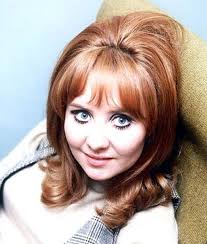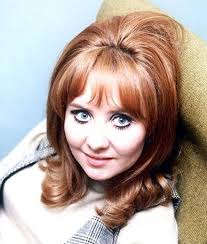Today we feature Glasgow’s ‘Bond Girls,’ which is to say, the Glasgow women who recorded James Bond movie theme songs.
Lulu
Lulu Kennedy-Cairns, in her early life, was known as Marie McDonald McLaughlin Lawrie. Born in the Glasgow suburb of Lennoxtown in November 1948, she grew up in the east Glasgow neighborhood of Dennistoun, reportedly on an estate with no hot water and an outside lavatory. Her father was a drinker, and Lulu witnessed violence at his hands toward her mother when young.
By the age of 12 of 13, Lawrie was singing with a band called the Bellrocks, appearing with them every Saturday night. Reportedly, her voice was even then amazing. By 14 years old she’d been discovered by Marion Massey, one of the first female managers of music artists. It was Massey who christened Marie Lawrie as ‘Lulu,’ and her band as ‘The Luuvers,’ Massey managed Lulu’s career for the next 25 years.

Lulu and the Luuvers charted a couple of minor hits and toured Poland alongside the Hollies before Lulu embarked, in 1966, on a solo career. She charted in 1967 with the Neil Diamond song, “The Boat That I Row,” under the svengali Mickie Most’s production. Lulu and Most collaborated on seven singles, all of which charted, yet Lulu parted with Most in 1969. In 1967 she also released her biggest hit, the theme to the Sidney Poitier film To Sir, with Love. Released as a B-side in the UK,”To Sir, With Love” was written by Lulu manager Massey’s husband Mark London; indeed, London wrote and produced much of the music Lulu recorded across her career. “To Sir, With Love” sold in excess of one million copies and was awarded a gold disc in the US.
Lulu appeared in the host’s role across several TV series in the late-60s, and in 1969 represented Britain in the Eurovision Song Contest with the song, “Boom-a-Bang.” Although she claims to have no fondness for the song, it remains her second-biggest UK single, and won her the Contest.
Lulu continued to record into the 70s, most notably recording the James Bond movie theme, “The Man with the Golden Gun,” in 1974. By the 1980s, Lulu all but faded from the charts, but continued acting, hosting radio, and taking to the stage in London musicals. Alongside Cliff Richard she holds the honour of having performed on UK’s Top of the Pops in all five decades of that program’s run.
Lulu resumed recording in the 90s, and continued to make TV appearances. In the early-oughts she was awarded the Order of the British Empire by Queen Elizabeth. She opened the closing ceremonies of the 2014 Glasgow Commonwealth Games, and continues to record and appear on screen.
Sheena Easton
Sheena Shirley Orr was born in 1959 in Bellshill, just south-east of Glasgow. The youngest of six to a steel mill labourer and his wife, Easton is said to have first performed publicly at the age of five, singing at her parents’ 25th wedding anniversary. Her father died five years later, in 1969, with her mother taking on a heavy workload to support the family.
Easton’s school grades earned her a scholarship to the Royal Scottish Academy of Music and Drama in Glasgow; she spent four years of the latter-70s training to be a speech and drama teacher while singing at night with a band called “Something Else.” In 1979 she married Sandi Easton, the first of her four husbands; but although the marriage lasted eight months, Easton kept her ex’s surname. That year, she auditioned and was selected to be the subject of a BBC programme called The Big Time, which chronicled a relative unknown’s rise to pop-music stardom. Here she crossed paths with stars such as Dusty Springfield and fellow Glaswegian Lulu, although Lulu’s manager Marion Massey told Easton that she was unlikely to make the “big time.” Regardless, Easton then successfully auditioned for a contract with EMI, was assigned a manager and producer, and was being filmed by The Big Time crew while making her first single, “Modern Girl.”

“Modern Girl.” reached #56 on the UK charts, seeing release before The Big Time aired (one wonders about the strategic order of these releases, but I digress). Her next single, “9-to-5” was released (to the ire, I daresay, of feminists everywhere and across all time), and reached #3 in the UK singles chart. “Modern Girl” subsequently re-entered the charts, and both songs simultaneously reached the UK Top 10. Easton received an assortment of media and popular accolades for her debut.
“9 to 5” was then released state-side as Easton’s first US single, although it was renamed “Morning Train (Nine To Five)” so as not to be confused with Dolly Parton’s then-current single, “9 to 5.” Despite what, to my ears, are cringe-worthy lyrics, the song became Easton’s only US #1 hit, and “Modern Girl” subsequently peaked in the US at #18. By the end of 1981, she also had a Top 10 hit in both countries with the theme to the James Bond film, “For Your Eyes Only,” and that year won the Grammy Award for Best New Artist.
Although she never again enjoyed the chart successes of the turn of the decade, Easton continued to record throughout the 80s, and in 1984 was nominated for the Best Female Pop Vocal Performance Grammy. Her 1985 follow up record, You Do, was produced by Nile Rodgers, yet still failed to have a breakout single. A 1987 duet with Prince fared better; “U Got The Look” was a #2 hit in the US, and led the pair to be nominated that year for both “Best R&B Vocal, Duo or Group” and “Best R&B Song.” In addition to recording, Easton made her TV debut in the late 80s, appearing across five episodes of Miami Vice.
Easton returned to Glasgow to perform at The Big Day festival in 1990, but on announcing that it was “good to be back home” in an American accent, she was unceremoniously pelted with bottles, some containing urine. Forced to cut her set short, she vowed never to perform in Scotland again.
Her 1991 album, What Comes Naturally was the last of hers to chart in the US, reaching #90. The following year, she became a US citizen, although retains her UK citizenship. Throughout the decade she continued to record, and appear on TV and Broadway, but reportedly enjoys a quieter life now as a sole parent raising two adopted children in Nevada.
It should here be noted that Edinburgh’s Shirley Manson, as the singer of the American band Garbage, became the third Scotswoman to sing a James Bond theme, The World Is Not Enough, in 1999. More on that at this earlier post.

Great write up! Interesting to learn more about the origins of these great singers.
LikeLike
Agreed, Noel, and thank you! Those are pretty good stats for a city of 600,000. There’s definitely a lot of talent from here, and it’s fun to get to explore it.
LikeLike